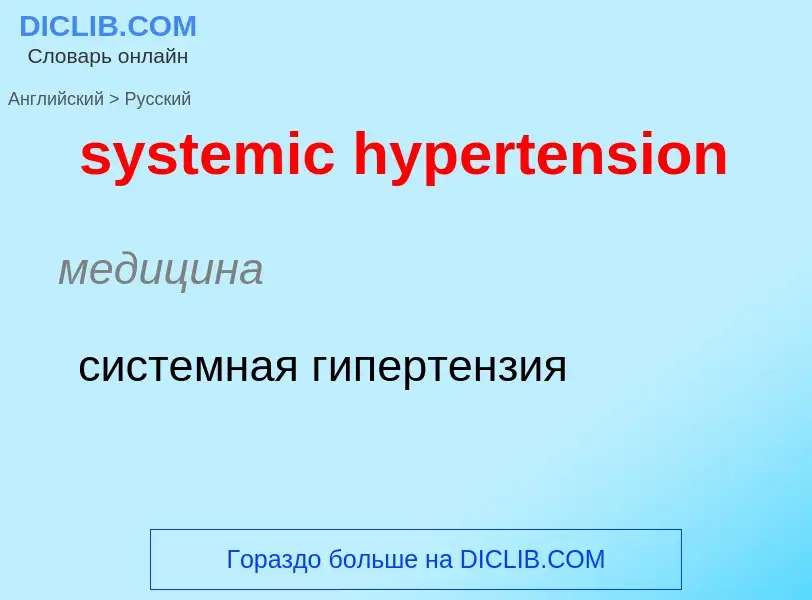Traducción y análisis de palabras por inteligencia artificial ChatGPT
En esta página puede obtener un análisis detallado de una palabra o frase, producido utilizando la mejor tecnología de inteligencia artificial hasta la fecha:
- cómo se usa la palabra
- frecuencia de uso
- se utiliza con más frecuencia en el habla oral o escrita
- opciones de traducción
- ejemplos de uso (varias frases con traducción)
- etimología
systemic hypertension - traducción al ruso
медицина
системная гипертензия
[haipə'tensiv]
медицина
гипертензивный
гипертонический
прилагательное
общая лексика
вызывающий гипертензию
медицина
характеризующийся гипертензией
страдающий гипертензией
существительное
[haipə'tensiv]
медицина
гипертоник
Wikipedia

Hypertension (HTN or HT), also known as high blood pressure (HBP), is a long-term medical condition in which the blood pressure in the arteries is persistently elevated. High blood pressure usually does not cause symptoms. High blood pressure, however, is a major risk factor for stroke, coronary artery disease, heart failure, atrial fibrillation, peripheral arterial disease, vision loss, chronic kidney disease, and dementia. Hypertension is a major cause of premature death worldwide.
High blood pressure is classified as primary (essential) hypertension or secondary hypertension. About 90–95% of cases are primary, defined as high blood pressure due to nonspecific lifestyle and genetic factors. Lifestyle factors that increase the risk include excess salt in the diet, excess body weight, smoking, physical inactivity and alcohol use. The remaining 5–10% of cases are categorized as secondary high blood pressure, defined as high blood pressure due to an identifiable cause, such as chronic kidney disease, narrowing of the kidney arteries, an endocrine disorder, or the use of birth control pills.
Blood pressure is classified by two measurements, the systolic and diastolic pressures, which are the maximum and minimum pressures, respectively. For most adults, normal blood pressure at rest is within the range of 100–130 millimeters mercury (mmHg) systolic and 60–80 mmHg diastolic. For most adults, high blood pressure is present if the resting blood pressure is persistently at or above 130/80 or 140/90 mmHg. Different numbers apply to children. Ambulatory blood pressure monitoring over a 24-hour period appears more accurate than office-based blood pressure measurement.
Lifestyle changes and medications can lower blood pressure and decrease the risk of health complications. Lifestyle changes include weight loss, physical exercise, decreased salt intake, reducing alcohol intake, and a healthy diet. If lifestyle changes are not sufficient, then blood pressure medications are used. Up to three medications taken concurrently can control blood pressure in 90% of people. The treatment of moderately high arterial blood pressure (defined as >160/100 mmHg) with medications is associated with an improved life expectancy. The effect of treatment of blood pressure between 130/80 mmHg and 160/100 mmHg is less clear, with some reviews finding benefit and others finding unclear benefit. High blood pressure affects between 16 and 37% of the population globally. In 2010 hypertension was believed to have been a factor in 18% of all deaths (9.4 million globally).






 Venenbild.jpg?width=200)
